Greetings from Buenos Aires!
Salutaciones de Nuestra Senora de Santa Maria del Buen Aire!

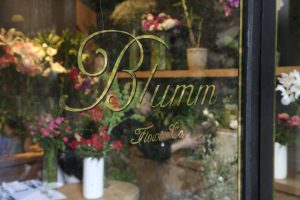 Its a cold but bright sunshine filled day in Buenos Aires. Just finished sipping a cappucino at a classic cafe in La Recoleta where the elderly men still dress in suits and older women wear fur coats for their afternoon java jolt.
Its a cold but bright sunshine filled day in Buenos Aires. Just finished sipping a cappucino at a classic cafe in La Recoleta where the elderly men still dress in suits and older women wear fur coats for their afternoon java jolt.
Prior to coffee we were communing with the dead in the Recoleta cemetery. Our taxi driver had difficulty understanding why we would fly clear to Argentina to go visit their cemetery. On any of my travels I always make sure I pay my respects to the dead. A lot can be learned there! The elaborate tomb stones provided an excellent overview of their immigrant heritage. Half Spanish and Half Italian, and a mongrel mix of a few other European countries scattered in between. More than 90% of this country is of European descent. The Spanish did a thorough job of completely wiping out the indigenous influence.
In all my international cemetery tours, I have never seen anything quite like La Recoleta. Each family has about a 20 square foot plot, jammed next to the next family’s plot. In one final attempt to out do their neighbor they built 30 + ft. high tombs to display their wealth and fame and aggrandize their self importance. But now the tombs like the rest of the city are decaying relics of a past colonial era.
We are adjusting quite well to the Vida Argentina. Two days ago our taxi driver who transported us from the airport to our hotel, gave us the low down on what to expect. First, he pointed out a horrific accident on the other side of the road. Bad drivers lead to bad accidents he said. He warned us that roads could close down at any time, so we might not even get back to the airport to fly out on Wednesday to the Andes. We told him we would be renting a car and driving on our own for a portion of the trip. He motioned the sign of the cross and told us we better start praying now. Protests and strikes are common occurrences here, so driving from Point A to Point B might be particularly arduous.
Two weeks ago the country’s taxi and bus systems were down, because of strikes. But in Argentine lingo, that was LAST week. Things are good now. Then our driver eyed me up and down, his eyes resting skeptically on my earrings. He told us to not wear any valuables, and be careful wherever we go, as we don’t want to attract robbers.
Naturally, after 24+ hours of travel his cautionary words of advice left me wondering what the hell we had gotten into. Our hotel felt like a safe refuge. In completely unfamiliar territory, I had no benchmarks for which to evaluate experiences. Was the street in front of our hotel safe? How about the plaza? What did a pick pocketer look like? In my afternoon stroll through the plaza, I walked with heightened senses and a fierce intentionality, speeding along thinking I might blend in as an Argentine walking with a clear purpose. Now two days later, I have adopted the city as my hometown. My personal map outlining the boundaries of my comfort zone expands with each new street I traverse. With time I take in information – from people’s glances, from crowded streets, from the sounds around me – and I evaluate that everything is just fine, no different from any other large city. Amazing how real life experience accompanied by the ability to take in and evaluate surrounding information, is always much different from worrying from afar.
Yesterday night we went to an excellent Tango show. The Tango developed during the colonial era when men would dance with each other, for lack of women, while longing for their friends and wives back home. The Tango is a passionate, forceful, restrained dance full of desire and longing for the partner. The Tango does not just stay on the dance floor in Argentina. The passion and desires infiltrate their lives, in relationships, in politics, and I’m sure a number of other areas.
My mom and I receive puppy eyed stares from men ranging from their twenties to their nineties. Flirting is part of life down here. And I fear passionate love affairs are too. In the few days we’ve been here, we have already been shocked by the number of affectionate couples, very loving towards each other, where the woman is about 25 years old and the guy about 60 + years old. We saw one such couple while on a historical tour, and our questions completely distracted us. Were they married? If they were married, it must have been recent, because they were awfully affectionate with each other. If they were married what did the young woman’s parents have to say? Were they having an affair? We concluded they were having an affair, along with all the other couples we’ve seen of similar age disparities who act as though they just fell in love. They all wear wedding rings.
Passionate protests are also a way of life down here as well. On our first day in BA, visiting the protests was our first priority. We landed in the middle of a crowd in front of the congress building, marching with the people for their rights. Drums banged, gun shots echoed through the streets. (which we learned were firecrackers) The only critique we’ve heard so far of Kristina Kirchner their president, is that she is too passionate, with not enough rational ability to compromise and let go of her fiercely held positions.
The Argentine history is also a passionately turbulent one. Their heyday was in the 2nd half of the 1800s and early 1900s. Colonial buildings, once full of grandeur and opulence, now stand tired and worn. The last century has witnessed years of coup d’ tat, military governments, repressions, fighting, and numerous protests. Stability is not part of the Argentine experience. The once wealthy neighborhoods have now become homes for bohemians and artists, with elegant stores underneath selling off the antique estates of the people who lived in these neighborhoods 100 years ago. Argentina is clearly living off its past!
So yes passion is a way of life down here. May the spirit of the Tango be with you all!
Greetings from Patagonia!
Greetings from the ends of the earth!
Patagonia is the land of “big foot.” When Magellan landed in these parts he observed the people ran faster than horses. In Spanish Pata means foot and perhaps with the aid of a Greek sailor the Spaniards came up with the term Patagonia. In Greek Gon means roaring. So actually we are living among the roaring big feet. So far though people have been quite pleasant and “amable.”
We just landed in San Martin de los Andes, on the exact opposite side of the country from Buenos Aires. Last year we were almost in the Artic, this year we are on our way to Antarctica. Gotta travel far these days to escape the smog! However, we are in wintertime here and the sky is cloudy and the air hovers in the 20s and 30s. I just spent my time viewing the area by internet. Its a gorgeous place! Nothing like internet travel these days.
We almost thought we would be stuck in BA as our airlines told us the flight was canceled due to the erupting Volcan Perito Moreno. Fortunately, the clerk had her geography mixed up.
Nevertheless, we were sorry to leave Buenos Aires! Life in BA is never dull. Throngs of people crowd the pedestrian streets. Every few blocks have a musician playing a pan flute, harp, or anything that elicits sound. The city is huge (13 million) and each few miles brings with it a new barrio, with unique character, spice, beautiful parks, grand buildings from the colonial era, and of course a neighborhood protest.
In just a few days we became immune to the many protests. While from home in CA the news of the mounting Argentine protests were alarming, from here they are a natural and common part of daily life. The other night we were the last car to whiz by the presidential offices before the police gated the palace to protect the building and its inhabitants from the people. Another day we found ourselves stuck in dense traffic because the people had closed down main arteries. We asked our taxi driver whether the protests are effective, and he said they serve to point out to the government the problems the people face. The government is so busy that they might not be aware of the people’s situations. Reading between the lines, though, it doesn’t sound like these protests effect much change. I imagine government officials peaking out of the office windows high up in their elegant colonial buildings, looking down on the people like an annoying buzzing fly.
The latest outrage is over taxes on exports which take money away from the farmers.
Some protests reflect history some 30 years ago. The people have amazing memories! Every Thursday afternoon mothers of “the disappeared” march on the Plaza de Mayo. These mothers lost their children in the “Dirty War” from the 70s in which military and government plucked off nonconformists from the streets and killed them. If a black Ford drove up next to you while you were walking the streets, you knew your end was imminent. Some estimate up to 30,000 people lost their lives in this manner. And while meager attempts have been made since to appease the people and their demands for justice, the military criminals are still at large living freely on the government’s pardon. Whenever we walk into an upscale, European classic coffee shop, my mom projects a murderous past on any well dressed gentleman older than 60.
Others are protesting veteran recognition for the Falkland island invasion from the 70s. At the time the government felt it needed to raise patriotic fervor, so it had two options. The country could invade Chile over a border dispute or it could invade the British control of the Islas Malvinas ‘Falkland Islands.’ The British took control over the islands in the early 1800s. Even though the Dutch were the first to land on the islands, the Argentines have always believed the land is rightfully theirs. Despite the fact that the land holds no beneficial resources, the government thought an invasion would be the perfect opportunity to raise the national spirit. The Argentines subsequently lost the war, overpowered by British and the US, and ever since the veterans
have been protesting for their rights and recognition. Among society, they are a disgrace.
I’m now off to hike the Andes and see if I can find any protesters in the forests.
I hope all is well and warm up north!
Greetings from San Martin de los Andes!
Buenas tardes, familia y amigos!
I better write now, while fresh off the homemade limoncello and while the creative muses are at work. We just finished a late afternoon, 4 p.m., lunch at the local Italian family’s cafe. Unfortunately they don’t take credit cards so we left with a kiss on each of the family’s cheek and a promise to return this evening for another meal and enough cash.
I’m always curious how commonplace etiquette reflects deeper cultural identity and behavior. Take for example, the common practice of kissing to greet and say goodbye. Just yesterday I witnessed two male policemen greet each other with a kiss. Imagine seeing that in the States! I cant help but wonder how a commonplace kiss influences other aspects of personal experience. The men appear unusually comfortable with each other, talking seriously and intently among themselves in coffee shops, freely exchanging kisses, and maintaining excellent eye contact. I contrast this with my experiences at home, where An astute observer might notice a slight edge and discomfort between men who greet each other with a high five slap or a punch in the arm.
While I didn’t find any public protests today in the Andes, I couldn’t escape my own internal persistence and determination to seek out Patagonia landscape despite the dismal weather. Fogged and rained in, there really isn’t much to do but relax, slow down, and read a good book in the local coffee shop. Of course, I don’t slow down until the odds for seeing the sights are clearly against me. We rented a taxi to the local ski resort, to at least see the mountains, but we arrived in fogged in conditions, so we told our driver to take us back. Feeling sorry for us, he returned us via the old-unpaved road to give us some different scenery. The trip highlight was seeing a ruddy faced Mapuche Indian standing on a rustic oxen cart, driving two oxen up the hill. This Indian lives his old fashioned lifestyle right next to a world class resort in the Andes. 500 years after the first colonizers arrived, the class distinction between Europeans and Indians still remains.
Now back to the fireplace! I hope you all are enjoying the heat, despite the CA fires which have made global news.
Greetings from Mendoza!
Buenas tardes, amigos y familia,
Greetings from the heart of Argentina’s Napa Valley! We just finished an 18 hour bus ride through 180 degree flat, scrub brush terrain. Only the Andes spared a good chunk of Argentina from complete aesthetic misery. Every so often the bus would stop in the absolute middle of nowhere to let a passenger off, and I couldn’t help but wonder what scrub brush benchmarks the lone passengers were using to identify their whereabouts.
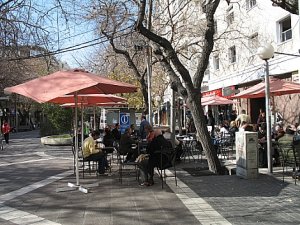 Coming from an independent traveling background where we always rent cars, the bus ride felt like dead space in between destinations, with nothing to engage in – no opportunity to rely on our own resources to navigate the country. The only moment of heightened senses occurred when some sadistically macho guy tried to warn us of all the dangers two women might face in Argentina. We had just gotten into a little dispute with the bus driver, and this passenger said we better stay on their good side or else they could shoot us when we get off. He then proceeded to rattle off a litany of dangers foreign women might face. I always marvel how travel requires us to quickly take in information, judge people’s characters, and make rapid evaluations, all within a few seconds. In this case, this passenger got his jollies out of scaring two “hapless” women and then proceeding to take care of us and protect us all the way to our destination.
Coming from an independent traveling background where we always rent cars, the bus ride felt like dead space in between destinations, with nothing to engage in – no opportunity to rely on our own resources to navigate the country. The only moment of heightened senses occurred when some sadistically macho guy tried to warn us of all the dangers two women might face in Argentina. We had just gotten into a little dispute with the bus driver, and this passenger said we better stay on their good side or else they could shoot us when we get off. He then proceeded to rattle off a litany of dangers foreign women might face. I always marvel how travel requires us to quickly take in information, judge people’s characters, and make rapid evaluations, all within a few seconds. In this case, this passenger got his jollies out of scaring two “hapless” women and then proceeding to take care of us and protect us all the way to our destination.
We left San Martin de Los Andes with a kiss and a handshake with the B&B owner. He wanted cash, and at the moment in our rush to get to the bus station we only had credit cards, so we promised to send the money when we return home to CA. We commented on his trust, and he replied “How could I not trust people who have just spent 5 days in my “home?”
The highlight of our stay in San Martin was sitting around the fireplace chatting with an Argentine family – 2 aunts and their respective teenage daughters. We engaged in a conversation about the making of “mate,” otherwise known as tea, the national Argentine drink. Through night and day, the Argentines publicly carry in their hand a half gourd (calabaza) with a special straw (bombillas) to drink their special tea, sort of like a toddler might drag around his favorite blanket wherever he goes. But they don’t let tourists in on their inner circle to sample their gourd protected tea. We asked the family why not, and they responded that drinking tea is very personal. They would never dream of selling the experience. Imagine, not making a profit when tourists who demand a surface experience of anything ‘cultural’ would pay a hefty price to just be let into the inner circle.
As the family explained the details of making mate, I could tell there was considerable more investment in the process than just the perfect cup of tea. I suppose warming the water to the precise temperature, pouring the tea leaves in, placing the straw at a perfect 45 degree angle, and waiting for just the right amount of fine white bubbles, is a daily routine that provides a certain amount of security and comfort like any routine might provide. But routines become ritual when there is meaning and personal significance. I can imagine the many warm memories toddlers build watching their mothers engaged in making the perfect cup. And they in turn engage in creating their own perfect cups, thereby cementing the experience in their bones. I cant help but contrast this experience with driving up to Starbucks at home and ordering our grande, Irish Coffee lattes to give us our morning java jolt… with no ritualistic engagement in the creation we accumulate just one more ‘dead space’ in the day.
While talking with the family, I couldn’t help but notice how thoroughly engaged and excited the teenagers were to be explaining the process of making mate to me and my mother. How refreshing to talk with enthused and engaged teenagers, with no attitude and no artificial boundaries between the generations. They convinced me to buy my own gourd, which can range between 50 and 1,000 US dollars, and afterwards the two teens inspected it with care and gave their stamp of approval.
On this trip, I have also made a personal pen pal – I suppose nowadays it would be a Skypepal – with another teenage girl. On our bus ride, we landed in a middle of nowhere place, and took in some hamburgers at the local McDonalds. A traveling family of grandparents, parents, and children kept looking at us, and then bright eyed, 13 year old Antoinella came over to ask us where we were from. When we responded, her eyes lit up and she could barely contain her excitement. She proceeded to give us her address, phone number, and email so that we would contact them when we arrived in their hometown, Cordoba. She asked with all the dreaminess a 13 year old holds for far off places, “Como es California?” My mom’s eyes teared up over her simple question. Antoinella paused, and I proceeded to describe the Sierras, the lakes, the ocean, the vineyards, and some of our beautiful cities. In her eyes, California held everything exotic, everything she could only dream about. Once again, I was amazed to be having such an animated conversation with this teenager, and even more amazed that she wanted to establish a pen pal relationship with an adult. We left the family with a kiss on each cheek, from the 6 year old to the 90 year old, and a promise to call them when we arrive in Cordoba.
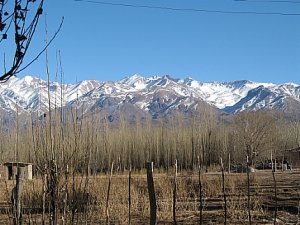 In all my travels, I have never met such friendly, gracious, laid back people. When we look at maps, people stop to help us. When we ask for directions, they personally escort us to the destination. When we eat in restaurants, they ask us where we’re from and so begins an hour long conversation. Of course, being able to connect with them in their native language significantly helps! And I’m amazed by their gracious use of their language. When I say thank you, they respond `al contrario` implying that we are the ones to be thanked. Or they respond `de nada` instead of `no problem` or after inspecting every leather jacket in the store and then leaving they will say that they are happy to serve us.
In all my travels, I have never met such friendly, gracious, laid back people. When we look at maps, people stop to help us. When we ask for directions, they personally escort us to the destination. When we eat in restaurants, they ask us where we’re from and so begins an hour long conversation. Of course, being able to connect with them in their native language significantly helps! And I’m amazed by their gracious use of their language. When I say thank you, they respond `al contrario` implying that we are the ones to be thanked. Or they respond `de nada` instead of `no problem` or after inspecting every leather jacket in the store and then leaving they will say that they are happy to serve us.
Now, I’m off to stroll the streets and gather an appetite for the typical 10 p.m. dinners
that the Argentines so enjoy!
I hope all is well in smoky California.
A Magical Moment in the Andes!
Buenas tardes amigos y familia,
Thank you all for your notes! I hope you are enjoying a glimpse of Argentina as much as I
enjoy writing about my experiences ;).
Yesterday we spent a magical day in the Andes. Out of all my travels, this is the first time I’ve actually been able to see the beauty without smog or thick clouds. In the Norwegian Fjords the cloudy weather blocked the view. In the Swiss Alps, the Austrian Alps and the Italian Dolomites, the smog blocked the view. In the Vietnamese Halong Bay, the poor weather made the views particularly misty. But here in the Andes in the very heart of their winter, we enjoyed a spectacular site amidst blue skies and extremely warm weather.
 I hiked to the foot of Mt. Aconcagua, just me and the mountain and nobody around. Imagine hiking in absolute solitude and silence through a snow covered valley that seemed to open up just to me with one of the tallest mountains in the world beckoning me forward. At 21,000 feet, Mt. Aconcagua is the tallest mountain in the world outside of the Himalayas.
I hiked to the foot of Mt. Aconcagua, just me and the mountain and nobody around. Imagine hiking in absolute solitude and silence through a snow covered valley that seemed to open up just to me with one of the tallest mountains in the world beckoning me forward. At 21,000 feet, Mt. Aconcagua is the tallest mountain in the world outside of the Himalayas.
What amazes me about the Andes, unlike anything else I’ve seen, is how I can walk right up to the very foot of each mountain. The mountains just begin right out of the flat land, with no foreplay, no foothills to prepare me. Each time I arrived at the foot of a mountain, I felt like I had arrived at the end of the rainbow and had found a pot of gold. At one point tears came to my eyes as I stood peering up at the mountains, feeling held by them and surrounded by their silent presence. Having traveled through hundreds of miles of desolate Argentine flat land, I really believe that if I had to live in the middle of nowhere I would not feel alone if I had mountains to accompany me.
What also amazes me about the Andes in the wintertime is that half of them were not covered in snow. Without snow they look as desolate as anything else in Argentina, just mounds of rock not looking particularly graceful or attractive. The lack of snow held a quiet foreboding quality for me. And standing at the foot of Mt. Aconcagua, sweating and hot as a spring day in CA scared me. I’m not the only worried one.
 I’m beginning to notice a trend in all corners of the globe, with the natives telling us their weather isn’t usual for the season. More recently I’ve noted a hint of concern from the people as they recognize their atypical weather is part of global climactic changes. Just 20 years ago, the environmentalist James Hansen stood in front of the US Congress appealing for help to save our planet. At the time Congress tried to discredit him. And just this year he forewarns that we have a window of approximately 10 years to change the planet’s direction.
I’m beginning to notice a trend in all corners of the globe, with the natives telling us their weather isn’t usual for the season. More recently I’ve noted a hint of concern from the people as they recognize their atypical weather is part of global climactic changes. Just 20 years ago, the environmentalist James Hansen stood in front of the US Congress appealing for help to save our planet. At the time Congress tried to discredit him. And just this year he forewarns that we have a window of approximately 10 years to change the planet’s direction.
Part of the highlight of any of our trips is talking to our taxi drivers. Yesterday’s chaffeur was a 20 year old college student working extremely long days in two jobs to pay his living expenses. He comes from a middle class family, his mother a dentist and his father a professor. Yet they can only take a brief vacation in a nearby city every few years. The rest of their time they spend working. This is the plight of the dwindling middle class in Argentina.
Argentina has been dwindling since the 1920’s or so. At the beginning of the 20th century, Argentina was destined to be one of the world’s greatest superpowers. But world wars, inability to strike a right trade balance, and government instability have all contributed to it’s diminishment. And since the 60s, their well known education system has been dwindling as well, with little support from the government. Our taxi driver recognized that without a solid education, ignorance will bring any country down. Hmm…. I leave you to make the connections.
Our taxi driver also enlightened us about Argentine protests. Just the other day I stumbled upon a very large protest, demanding the agricultural industry to stop stealing the wealth. I marched around the plaza with the drummers, feeling like I was apart of something great. But alas our taxi driver told us many of the large protests are a scam. The wealthy pay the people to create a protest. As long as the protesters are paid, they aren’t discerning and will join any protest that comes along. Likewise, the current president is paying off the opposition so that she gathers all the power. Each person I talk to gives a different and passionate perspective about government and protests. In the end, I’m left entirely confused. Scam protests, multiple passionate perspectives, corruption, disillusion, conflicting facts…
Even the taxi drivers around the world recognize that the US is a falling empire. They are disgusted with our imperialism, but fortunately most are able to separate our government’s actions from the American people. At this point I think our dollar among all developed countries may only be equal to Canada.
On that dismal note, I’m off to chat with more Argentines.
Greetings from Cordoba Part I
Querido amigos y familia,
Happy Friends Day! When we landed on the moon, Argentina established a friends day which
gives them all the more reason to gather over a late night meal, and lose some more sleep from the little that they already get.
Restaurants in Argentina open up at 9 p.m. for dinner and they usually fill around 10 p.m., so I’m taking the evening break to gather my reflections.
We just finished off 12 more hours driving through desolate Argentine flatlands. From 9 a.m. to 9 p.m. cows were the only exciting new introductions to the landscape. Given the distances between places we decided to forego driving a car and since we have been told 150 people die each day on the roads, the decision has proven wise! We personally witnessed such crazy driving with deranged 18-wheeler truck drivers whipping around high mountain curves in the Andes, crossing double lines to pass their fellow colleagues in other 18 wheel trucks. Sort of like watching trucks test their luck on a Nascar race track.
We have learned to choose our “battles” on these long bus drives. This time we voted for the air conditioning battle, to the detriment of the repetition of the same-stuck-stanza-of-music-for-two-hours battle. We have been warned by 3 different men to be particularly careful in Argentina. We have heard everything including the possibility of us being shot and killed by bad bus personnel, robbed, and attacked, along with words of advice to never trust or confide in any Argentine, because they are deceitful. However, we have enjoyed nothing but the most friendly, courteous, and hospitable people.
Travel through Argentina has generally been a culinary and decadent delight. We leisurely begin the day over a cappucino in an outdoor cafe, strike up conversation with the locals, head off to a 5 course, 3 hour meal for $20 a person, strike up some more conversations, stroll around the park and take in the mate drinkers, and then close off the evening with a light dinner at 9 p.m. These days are interspersed with some serious day long sight seeing as well.
I’m still amused by the hordes of gourd carrying mate drinkers. From my biased cultural Freudian perspective, I can’t help but think that these people have some unhealthy psychological attachment to their gourd and their tea. Everywhere, night and day, they fondly carry around their gourd and the corresponding accoutrements, including the leather case to carry the thermos along with additional pouches for the tea, sugar, bombilla, and calabaza. Yet, I know the analysis is entirely unfair and a result of my education which trains us to label healthy and unhealthy behavior according to our own distorted value on independence and individualism.
Today I saw a four year old happily carrying his milk bottle around. Through my cultural lens, I might think this poor four year old hasn’t progressed through his appropriate developmental stage as he should have given up his bottle long ago. But cultural lens aside, I can’t help but wonder if we tend not to instinctively trust the natural, fluid and individual progression of life by creating artificial boundaries around what is normal and expected.
Yesterday we went mass hopping. Churches were the only sights to see on a Sunday in Cordoba. The Churches were only filled with a handful of people. The priests stood high up at the altar, dressed in their medieval regalia. The people repeated prayers as they were prompted. Some stayed afterwards kneeled before the side altars with ethereal looks on their faces as they fervently prayed to the saints. I’m not surprised to hear that the Catholic Church is losing ground in South America, because the dying rituals feel so distanced from the people. I suspect the making of mate holds more ritualistic leverage in some circles than the Catholic Church.
My mom has been getting lots of stares from young and old alike. In these cases she obediently refers back to the rule of St. Augustin: If perchance your eyes should meet a man, you may not fix your gaze.
Homeless dogs are all over! Stray dogs sleep at the doorsteps of stores. They wander the parks. The city is their home. The poor dogs don’t know what they are missing what with the decadent life they could have lived in California, with their own personal purse pouches, sweaters, and doggy cookies!
Today we stood in solidarity with the Columbians as we marched with a student gathering of Columbians protesting FARC and their kidnappings. We left with pictures, handshakes, smiles, and sporting the Columbian flag on our sweaters. We are getting well versed in South American politics.
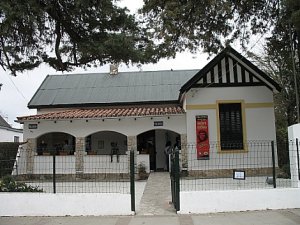 We can selfishly count our blessings for the Argentine senate’s vote the other day. To end several months of heated debate and strikes, the senate voted on the issue of whether to lower the tax on soy exports. The vote was tied 35 – 35, and the vice president took an extraordinary stand against the president and voted to lower the taxes. This issue is a complicated one and I finally understand many of the details. Most of the people are now happy, but they agree that the entire country has acted like teenagers these past months. Between the farmers who blocked the roads and completely destroyed tourism (we seem to be the only Americans down here!) and trade (empty grocery shelves and long gas lines for weeks), and the president who usurped all the power in the first place to raise export taxes to nearly 50%, the people wish there had been another way to solve these problems. They recognize that there must be a happy medium between their own passionate and reactionary engagement and the dispassionate apathy that they observe among their American neighbors to the far north.
We can selfishly count our blessings for the Argentine senate’s vote the other day. To end several months of heated debate and strikes, the senate voted on the issue of whether to lower the tax on soy exports. The vote was tied 35 – 35, and the vice president took an extraordinary stand against the president and voted to lower the taxes. This issue is a complicated one and I finally understand many of the details. Most of the people are now happy, but they agree that the entire country has acted like teenagers these past months. Between the farmers who blocked the roads and completely destroyed tourism (we seem to be the only Americans down here!) and trade (empty grocery shelves and long gas lines for weeks), and the president who usurped all the power in the first place to raise export taxes to nearly 50%, the people wish there had been another way to solve these problems. They recognize that there must be a happy medium between their own passionate and reactionary engagement and the dispassionate apathy that they observe among their American neighbors to the far north.
Had the vote turned out any differently, the farmers would have created the road blocks all over again, and this time the government would have had the legislature on its side to begin repressing the people. Had the vote turned out any differently, we seriously could have been stuck in Argentina for quite a while!
I hope all is well in your respective corners of the globe!
Greetings from Cordoba Part II
Querido amigos y familia,
Just climbed out of our stuck elevator in the hotel, after some time stuck inside.
We have been spending our last day in Cordoba leisurely sipping cappuccinos, chatting with the locals, and discussing what we’ll miss about Argentina and what we’ll look forward to in California. Unfortunately while sipping cappucino, we missed a sizeable protest of 14,000 people nearby.
Yesterday I spoke with a store clerk whose eyes lit up when she heard that I am from CA. She just loves the United States. The people are so respectful, she says, and she adores the newness much more than the oldness found in Europe. I couldn’t help but think that we all tend to come alive over all things foreign.
I will miss the Argentine’s graciousness and their “please-don’t-thank-me” hospitality. Any “thank you” receives the reply of “no, por favor…” and a certain tonal inflection which indicates that appreciation isn’t necessary. I will also miss the significant number of eyes that sparkle with life.
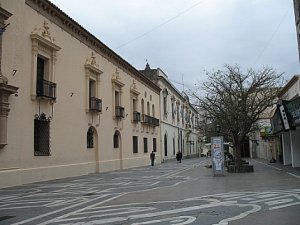 Above all, though, I will miss the fluidity and vibrancy of life here. Experiences are not bound by distinct categories. Work and home blend through the day, with 3 hour siestas right in the middle. Exercise is not relegated to the gym. Children’s play is not relegated to organized soccer on the weekends or pre-determined play dates. While we spend so much time in the States in cars, traveling in isolated “dead space” from one experience to the next, the people here build their lives around walking. Their home is the town. Exercise is a natural part of their daily life. Children’s play occurs spontaneously on the streets. People take a break from work and meet for espresso at an outdoor cafe. Mom and pop stores still provide richness to shopping, despite the presence of global corporations like Wal Mart which just add one more “dead space” to the day. I will definitely miss the experiential richness that walking everywhere allows.
Above all, though, I will miss the fluidity and vibrancy of life here. Experiences are not bound by distinct categories. Work and home blend through the day, with 3 hour siestas right in the middle. Exercise is not relegated to the gym. Children’s play is not relegated to organized soccer on the weekends or pre-determined play dates. While we spend so much time in the States in cars, traveling in isolated “dead space” from one experience to the next, the people here build their lives around walking. Their home is the town. Exercise is a natural part of their daily life. Children’s play occurs spontaneously on the streets. People take a break from work and meet for espresso at an outdoor cafe. Mom and pop stores still provide richness to shopping, despite the presence of global corporations like Wal Mart which just add one more “dead space” to the day. I will definitely miss the experiential richness that walking everywhere allows.
I look forward, though, to returning to a country where even sprawling shopping malls hold some aesthetic beauty. Besides the spectacular Andes and some of the architectural beauty from Buenos Aires’ past, I do not recommend coming to Argentina for aesthetics. Streets are dusty. There are no fines for littering. Everything is dry and brown. Homes consist of four walls of grey cement, with bars over the windows. Unlike Mexico which does a wonderful job of beautifying it’s interior spaces with colorful tile, fountains and artwork, Argentina’s interior does not appear markedly different from it’s drab exterior. The arts seem non existent. Their crafts are clumsy, meant to sell as tourist trinquets, rather than to capture any particular spirit or grace.
Argentina aside, I will keenly miss that sense of aliveness which always accompanies me on my travels. My senses always heighten when I experience contrasts to what is familiar and normal. I also appreciate the increased perspective contrasts provide me as I realize that there is more than one way of doing things. I enjoy critically evaluating those behaviors which blanket a culture as “normal.”
I hope that my travel tales have given you a glimpse of Argentina or at least a glimpse into my experiences of the country and my philosophical musings.
May the spirit of travel always be with you wherever you are.

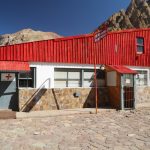



Leave a Reply